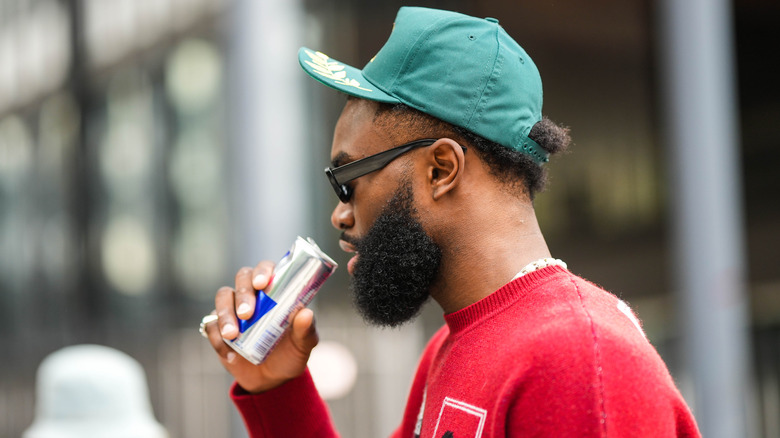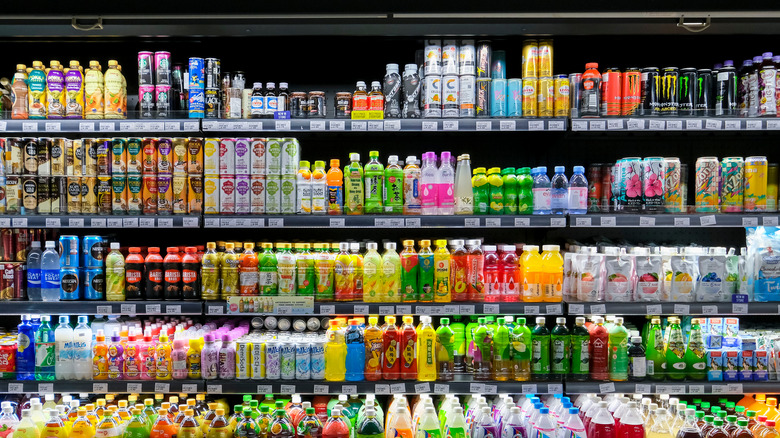Are Any Energy Drinks Gluten Free?
Energy drinks have grown in popularity and expanded to dozens of brands over the last few decades. These drinks have become increasingly mainstream and are offered by many distributors in various flavors. The major companies such as Red Bull and Monster are well-known for advertisements and appear on many store shelves worldwide. Energy drinks originated in Japan in the 1960s but really caught on in the 1990s when they expanded to the United States, according to The New York Times.
Energy drinks contain many ingredients that combine to increase energy, usually based on caffeine, vitamins, and antioxidants such as taurine that provide a "boost" to mental and physical power. While these drinks do provide energy (at least temporarily), they may come with health risks. Although caffeine is a drug, energy drinks fall between the cracks as they are typically categorized as dietary supplements and conventional foods, according to Hospital Pharmacy. In essence, the drinks are regulated to a degree, but they do not undergo a Food and Drug Administration (FDA) approval process.
Consumers with preexisting conditions or allergies to certain ingredients may also be concerned about what is in energy drinks. One of these pressing concerns regarding energy drinks is whether or not they contain gluten.
Gluten can lead to serious health issues.
Awareness of the adverse effects of consuming gluten for some has risen significantly in recent years, with some people having been diagnosed with gluten sensitivity or intolerance after experiencing stomach issues. Gluten is a family of proteins present in grains including wheat, barley, and rye. Gluten is responsible for holding in moisture and providing the foods that contain it with a chewy or soft texture (per Healthline).
Unfortunately for some, like those with Celiac disease, gluten can cause various adverse health reactions when consumed. In those with Celiac disease, the small intestine reacts negatively to gluten. This can cause symptoms such as pain, nausea, vomiting, and damage to the intestine lining (per Mayo Clinic).
While energy drinks may not seem likely to contain gluten, it's not worth it to those who would experience unpleasant symptoms to risk it. Though some brands clearly label their drinks gluten-free, others are less forthcoming. So which energy drinks are actually listed as gluten-free?
The brands that are reported to be gluten-free
Gluten in a product is counted by PPM or parts per million. A food can be labeled gluten-free if it contains less than 20 PPM gluten (via the Federal Register). Many popular energy drinks fall into this category.
Rockstar is distributed through Pepsi and comes in multiple flavors. While the label does not state that it is gluten-free, none of the ingredients are gluten allergens, per Celiac.com. The same is true for AMP, another Pepsi product.
Monster is one of the larger energy drink brands and comes in multiple forms including Monster Energy, Monster Rehab, and Monster Ultra, with varying purported benefits. All brands of Monster energy are considered gluten-free, according to Celiac.com.
Red Bull may be the most well-known energy drink. The company describes all beverage flavors as containing no dairy, lactose, wheat, or gluten.
Vitamin Water Energy offers B vitamins, guarana, and caffeine in its energy blend. The company provides that none of its products contain any gluten or casein.
Bang has grown increasingly popular with the fitness crowd as they advertise the product as a possible pre-workout drink with high levels of caffeine, Creatine, and CoQ10. On their page, they state that the reformulated Bang energy drinks are proven to be gluten-free, but the older versions that include BCAAs are not.


